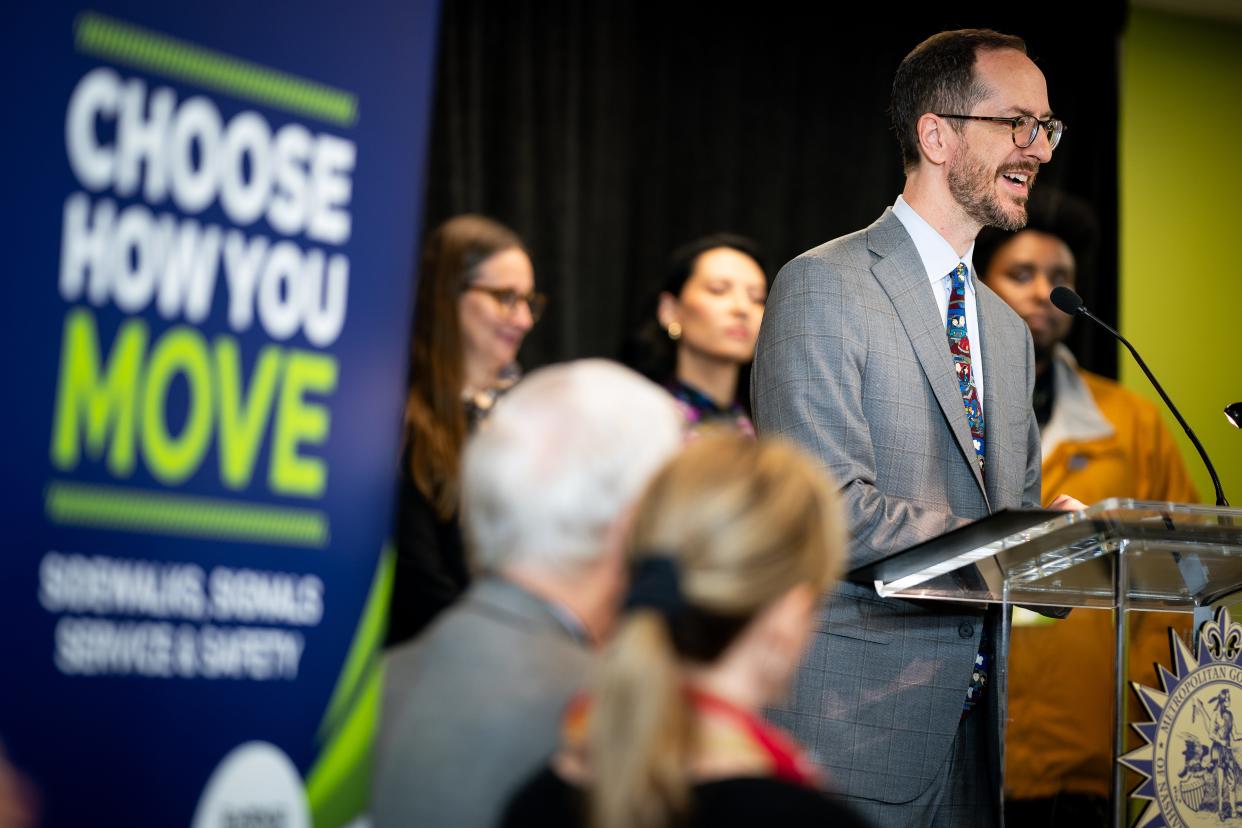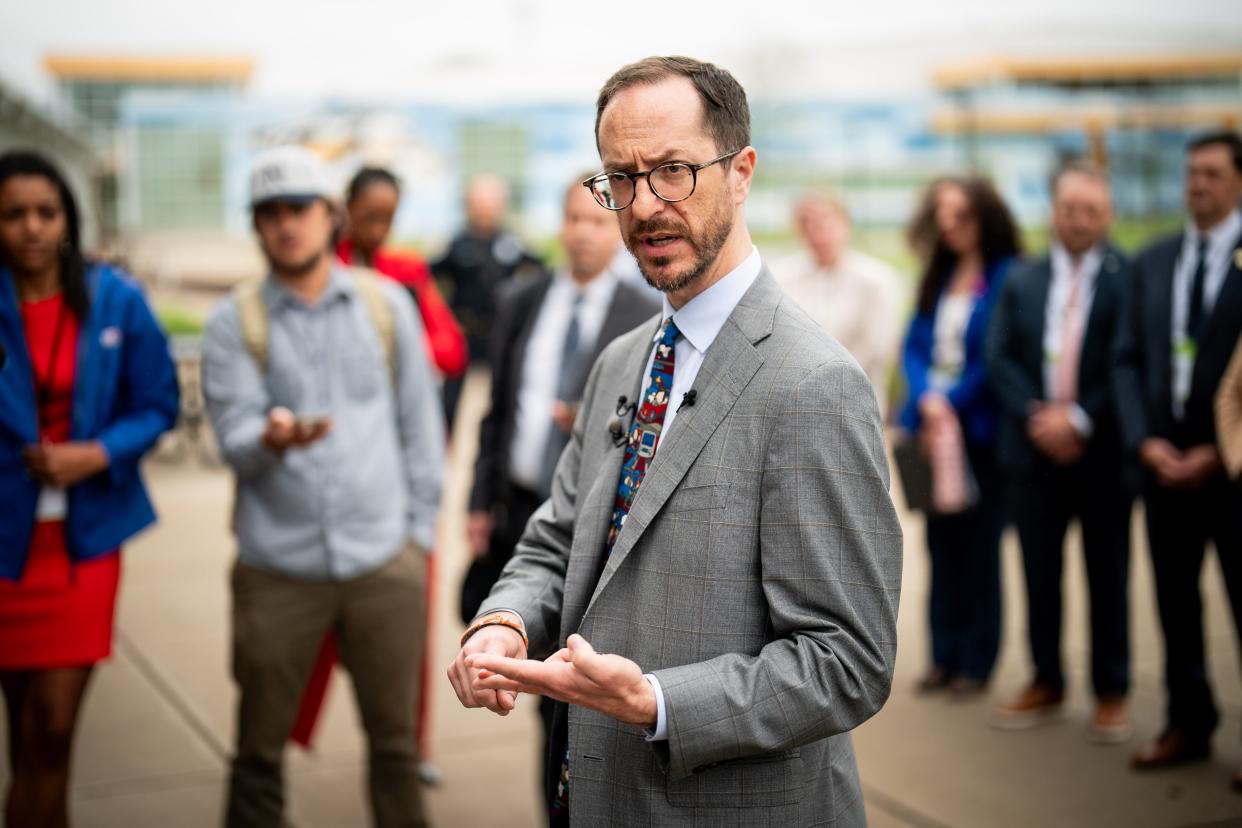Nashville transit plan supporters launch campaigns. Formal opposition absent — for now
Less than a month after Nashville Mayor Freddie O'Connell announced the full details of his "Choose How You Move" proposal to improve city transportation with a sales tax hike, community groups are coalescing in support and standing up education campaigns.
O'Connell and his supporters have a relatively short window to win over Davidson County voters before the initiative appears on ballots on Nov. 5. What hasn't appeared — at least thus far — is organized opposition.
Some of the failed 2018 transit program's most ardent opponents seem more amenable to O'Connell's proposal, which would raise the Davidson County sales tax by half a cent to fund accelerated expansion of Nashville's bus system, dozens of miles of new and improved sidewalks and bike lanes and nearly 600 upgraded traffic signals to better handle vehicle congestion.
The plan's initial cost rings in at around $3.1 billion in 2024 dollars, with recurring costs estimated at $111 million. The price tag and financial details are under required review by a third-party auditor and the state comptroller.
The proposal has enjoyed early support from the Transit Alliance of Middle Tennessee and a coalition of Nashville organizations, as well as Moving Forward, a regional transportation advocacy organization backed by the Nashville Area Chamber of Commerce. Nashville Moves, a support campaign helmed by former O'Connell campaigners Jeff Morris and Scott Dietz and attorney Charles Robert Bone, launched on April 19.

Community advocacy organization Nashville Organized for Action and Hope attended O'Connell's April 19 announcement, distributing statements of support for the plan in tandem with a list of provisions they said are needed to mitigate the sales tax increases' disproportionate impact on lower-income community members. O'Connell's administration has yet to release a specific roster of equity initiatives outside bus route expansions and infrastructure improvements that will be included in the plan.
Two of the 2018 transit referendum's biggest detractors, Americans for Prosperity and the Beacon Center of Tennessee, have spoken fondly of the traffic signal, sidewalk and bus system improvements included in O'Connell's proposal while noting reservations related to affordable housing initiatives and potential road diets for dedicated bus lanes.
More: Nashville's $3.1B transit plan: What's in it and how much it will cost taxpayers
2018 referendum opponents: 'Lots to like in here,' but elements of concern
Americans for Prosperity, an anti-tax advocacy group funded by the Koch family that fought to kill the 2018 referendum, won't run a formal opposition campaign this time around. In a statement on May 2, the group called O'Connell's proposal — which notably steers clear of costly light rail options — "more reasonable" than the 2018 plan.
"It's up to (O'Connell's) office to make the case for a higher sales tax to fund more bus services, improved lights, and better city crosswalks," wrote Tori Venable, the groups’s Tennessee director. "Ultimately, Nashville will decide if the transit services and improvements are worth the tax hike."
"(There's) lots to like in here, lots that we think should be commended in terms of focusing on things that benefit all users, things that can be done quickly," Ron Shultis, director of policy at the Beacon Center, a think tank that opposed the 2018 referendum, said of O'Connell's proposal.

Among his favorites: a mechanism to fund sidewalks (the center represented two Nashville landowners in a lawsuit contesting a code requiring builders to construct sidewalks or pay fees), updates for traffic signals, plans for more park-and-rides around the county's edges and expansion of the city's WeGo Link program, which partners with Uber and other ride-share providers to offer subsidized fare to certain bus stops for riders in less-dense areas of the county.
But Shultis does have concerns. He's skeptical of the plan's inclusion of funds for Metro to purchase about 26 acres of land adjacent to planned transit centers, which could be transformed into affordable housing or other community amenities through public-private partnerships. He sees this as "Metro kind of getting into the development business."
"We always think that government should stick to the basics: roads, buses, schools, public safety," Shultis said. "Leave the private sector to do what it does best."
The city could consider allowing more density around transit centers through zoning changes, he said, or offer density bonuses in those areas to incentivize more housing.
He's also concerned about the details of bus rapid transit routes, namely, whether Nashville's major corridors have the population density to support them, and if the city is going to remove traffic lanes to create bus-only lanes in areas where corridors already see more than 25,000 average daily trips (above the threshold for the federal recommendation for road diets).
The exact location of bus-only routes, and whether they would supplant motorist lanes, have yet to be determined.
More: Could Nashville vote on mass transit next year? What a successful path may look like
Advocates highlight transportation as cost-saving, community-connecting necessity
Representatives from 13 community organizations and the Transit Alliance of Middle Tennessee met at a May 1 news conference to show their support of the transportation improvement program.
Transit Alliance CEO Jessica Dauphin said the group will "activate" nearly 600 alumni from its Regional Transit Citizen Leadership Academy to help educate people on the benefits of the projects proposed in "Choose How You Move." Marta Silva, co-executive director of Conexión Américas, said they will facilitate workshops to provide education on the plan for the Latino community.
Nashville Food Project CEO C.J. Sentell highlighted transportation's "inextricable" link to food security.
"Transportation is the highest barrier to accessing fresh, nutritious food ... more important than the location of a grocery store or the price of food," Sentell said.
Mary Beth Ikard, communications manager for The Housing Fund, said the city had "some difficulty acknowledging" the link between transit accessibility and affordable housing in the lead-up to the 2018 referendum, but the cost of automobile ownership "escalated exponentially" post-pandemic.
"By investing in public transportation, walking and bicycling, we will create an opportunity to reduce the cost of living on limited-income households, to where even if their housing expense — mortgage or rent — is high, they will be able to have their income go further," Ikard said.
And the city has policy tools (like the Metro Nashville Community Land Trust that The Housing Fund stewards) to address gentrification or displacement caused by land value increases that result from new, high-quality transit infrastructure, she said.
"The Housing Fund as a lender to under-resourced individuals and builder-developers is committed to being part of the solution so that we can build new infrastructure in communities that have frankly been starved of that infrastructure for generations and have been asking, clamoring, for better sidewalks (and) affordable modes of transportation," she said.
Community groups who spoke in favor of the proposed transportation plan include:
WalkBike Nashville
The Civic Design Center
Network for Sustainable Solutions
Nashville Food Project
Nashville Area Hispanic Chamber of Commerce
Thistle Farms
Greater Nashville Realtors
Urban Housing Solutions
The Housing Fund
Moving Forward
Inclusion Tennessee
The Urban League of Middle Tennessee
Conexión Américas
This article originally appeared on Nashville Tennessean: Nashville transit plan support campaigns launch sans formal pushback
